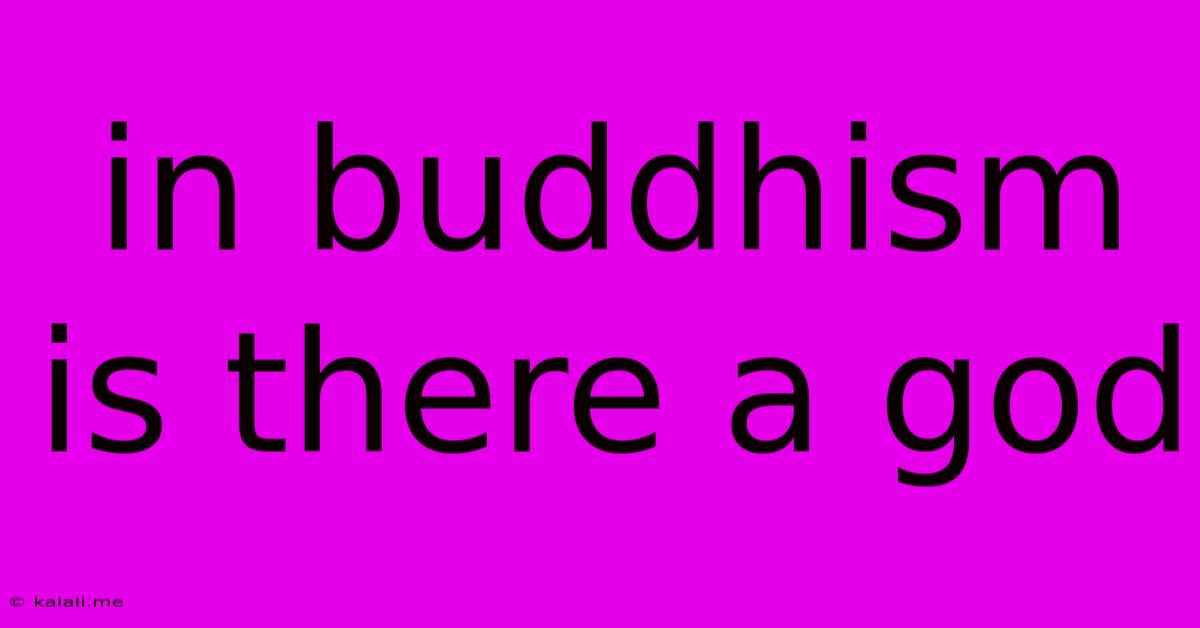In Buddhism Is There A God
Kalali
May 22, 2025 · 3 min read

Table of Contents
Is There a God in Buddhism? Understanding the Buddhist Perspective on Divinity
The question of whether there is a God in Buddhism is complex and often misunderstood. Unlike many theistic religions that center around a creator God, Buddhism offers a unique perspective on divinity and ultimate reality. This article explores the nuanced Buddhist view, clarifying common misconceptions and highlighting the core tenets that shape their understanding.
Buddhism doesn't posit a personal God in the traditional sense – a supreme being who created the universe and actively intervenes in human affairs. Instead, the focus is on the individual's journey to enlightenment and liberation from suffering, a process achieved through self-cultivation and understanding. This doesn't necessarily negate the existence of deities; however, their role and importance are significantly different than in theistic religions.
The Concept of Devas and Bodhisattvas
Buddhist cosmology includes various celestial beings, often called devas (gods) or deities. These beings inhabit different realms and possess supernatural abilities. However, these devas are not considered creators or all-powerful beings; they are still subject to the laws of karma and rebirth. Their existence is part of the cyclical nature of samsara, the continuous cycle of birth, death, and rebirth.
Furthermore, bodhisattvas, enlightened beings who postpone their own nirvana to help others achieve enlightenment, hold a significant place in Buddhist thought. They are often revered and worshipped, but their role is fundamentally different from a creator God. They are seen as examples of compassion and guides on the path to enlightenment, not all-powerful deities dictating the course of human existence.
The Emphasis on Self-Reliance and Personal Growth
The core of Buddhist practice is centered around self-discovery and the cultivation of wisdom and compassion. The ultimate goal is to achieve nirvana, a state of liberation from suffering and the cycle of rebirth. This journey is undertaken through practices such as meditation, mindfulness, and ethical conduct. The emphasis is placed firmly on individual effort and self-reliance, rather than reliance on a divine savior or intervention.
This self-reliance is reflected in the Buddhist concept of karma, the principle of cause and effect. Actions have consequences, shaping one's future experiences. This concept emphasizes personal responsibility and accountability, diminishing the need for a divine judge or intermediary.
Different Buddhist Traditions and Perspectives
It’s crucial to note that there are various schools and traditions within Buddhism, and their perspectives on deities may vary slightly. Some traditions might incorporate elements of deity worship more prominently than others, while maintaining the core Buddhist tenets. However, the overarching principle remains consistent: the emphasis on self-cultivation and the journey towards enlightenment remains central, irrespective of the role given to deities.
Conclusion: A Path to Enlightenment, Not Divine Intervention
In conclusion, while Buddhism acknowledges the existence of various celestial beings, it does not center around a creator God in the traditional sense. The focus is firmly on the individual's path to enlightenment, achieved through personal effort and understanding of Buddhist principles. The concept of a personal God is largely irrelevant to the core tenets of the Buddhist faith, which emphasizes self-reliance, compassion, and the liberation from suffering. Understanding this nuanced perspective is crucial for comprehending the richness and complexity of Buddhist thought.
Latest Posts
Latest Posts
-
Does Bug Repellent Work On Fleas
May 22, 2025
-
Euston Station To Kings Cross Station
May 22, 2025
-
No Hot Water Coming Out Of Faucet
May 22, 2025
-
How Long Does Fresh Yeast Last
May 22, 2025
-
How To Become Lucky Friends Pokemon Go
May 22, 2025
Related Post
Thank you for visiting our website which covers about In Buddhism Is There A God . We hope the information provided has been useful to you. Feel free to contact us if you have any questions or need further assistance. See you next time and don't miss to bookmark.